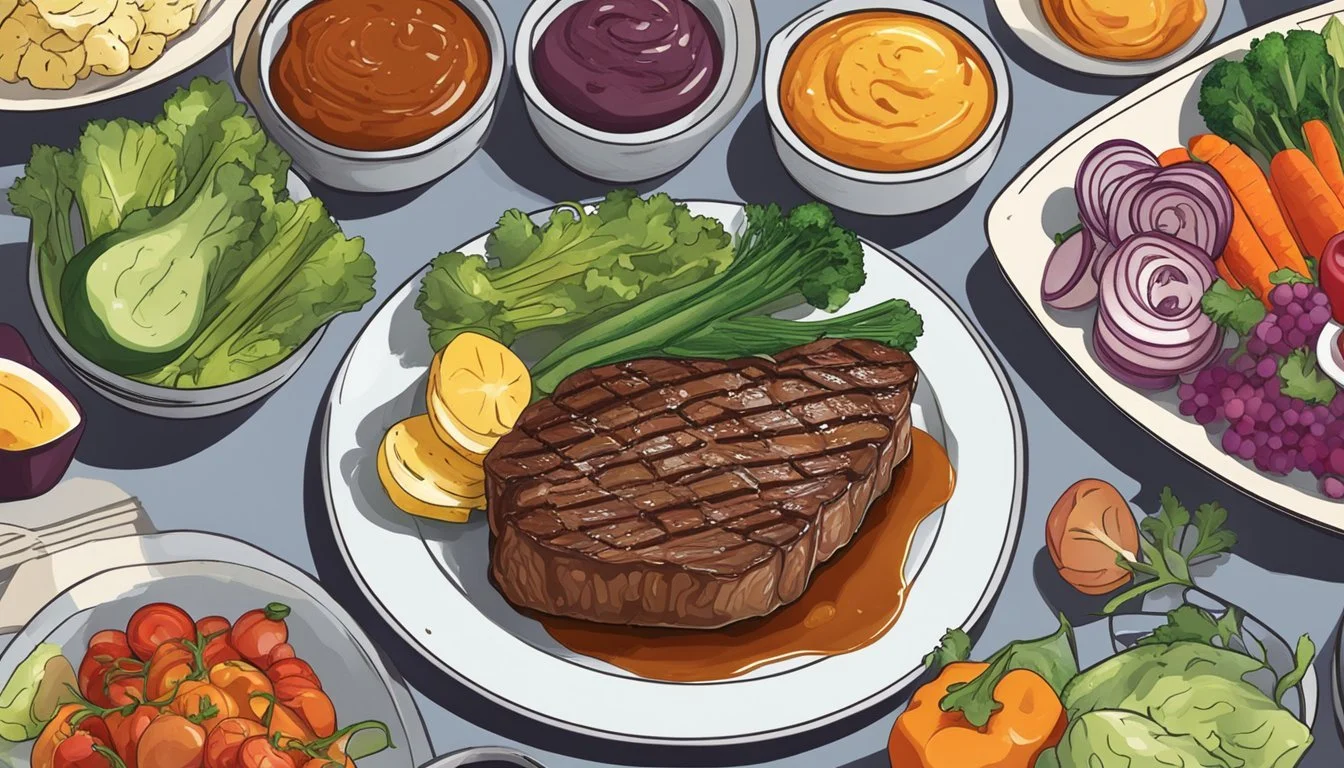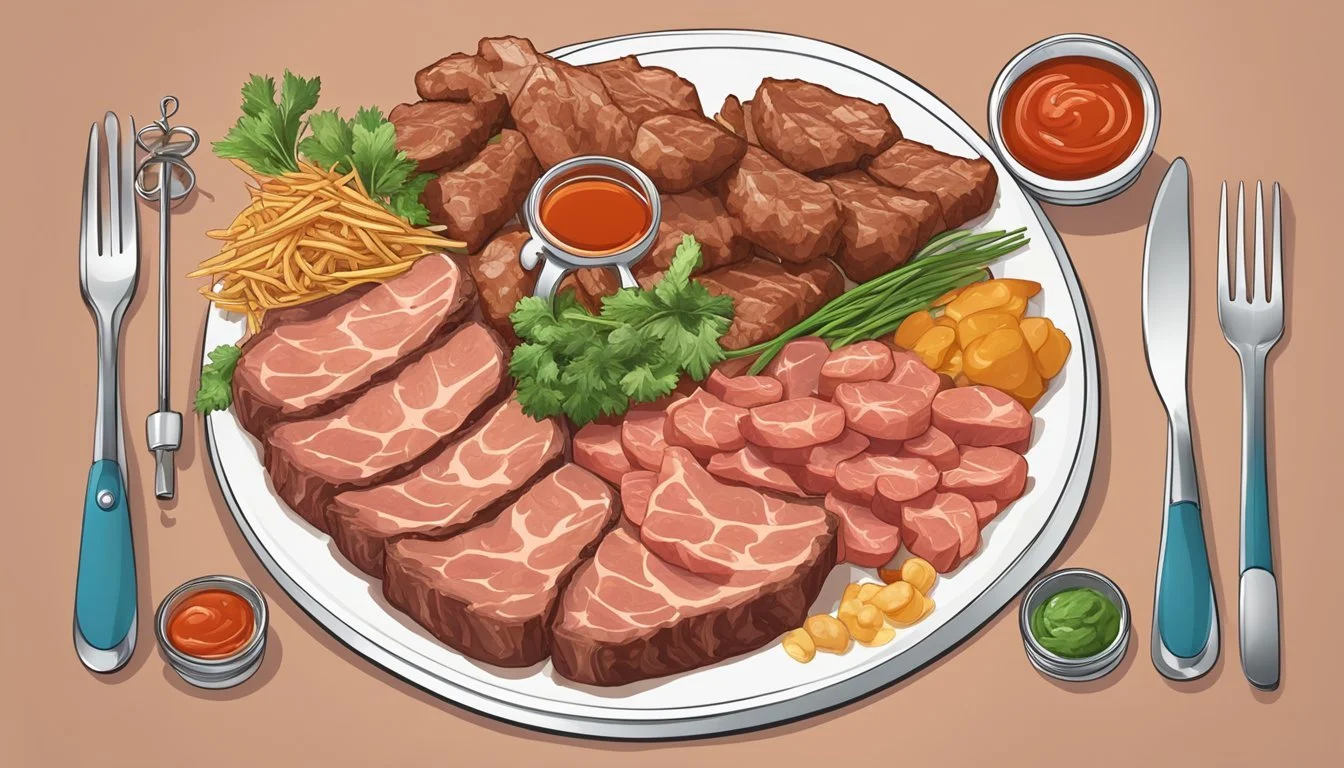Can You Have Sauce on Carnivore Diet
Guidelines for Complementary Condiments
When adopting a carnivore diet, individuals commit to consuming exclusively animal products, which often raises questions about the inclusion of sauces and seasonings. The carnivore diet emphasizes the elimination of plant-derived foods, focusing on meats, fish, eggs, and certain dairy products. In this dietary regimen, the primary goal is to stick to foods that are low in carbohydrates, free of sugar, and devoid of additives that are common in many processed foods.
Sauces and seasonings may seem like a minor component of a meal, but for someone following the carnivore diet, the details matter. Many common condiments are plant-based and contain sugars, artificial flavors, and other additives. Therefore, they typically don't align with the dietary principles. However, there are options for carnivore dieters who wish to enhance the flavors of their meals without breaking the dietary framework. Pure animal-based additions such as butter, certain dairy-based sauces like homemade sour cream, and bone broths are acceptable, provided they do not contain non-animal additives.
Seasonings pose a similar conundrum. Traditional table salt and some pure spice-derived seasonings could be used in moderation to flavor food; however, mixed spices or seasoning blends often contain sugars or other non-carnivore-friendly ingredients. It is crucial for those on a carnivore diet to check the labels and make informed choices when it comes to sauces and seasonings to adhere to the strict nature of their dietary guidelines.
Understanding the Carnivore Diet
The Carnivore Diet emphasizes a menu restricted to primarily animal-based foods, advocating for the elimination of plant-based ingredients. By focusing strictly on this dietary intake, proponents claim various health benefits.
Carnivore Diet Fundamentals
The Carnivore Diet is a restrictive regimen that exclusively includes animal products, eliminating all plant-based foods. At its core, it rests on the premise that early humans thrived on animal foods and that contemporary health issues are often due to the inclusion of plant foods, and processed foods in modern diets.
Primary Focus: Consumption of animal products
Exclusions: All plant-based foods and processed food items
Allowed Foods on the Carnivore Diet
Individuals following a Carnivore Diet consume an array of animal products. The diet permits the consumption of:
Meats: Including beef, pork, lamb, and game
Poultry: Such as chicken, turkey, and duck
Organ Meats: Such as liver, kidney, and heart
Fish and Seafood: All types
Animal Fats: Including lard, tallow, and butter
Eggs: From chickens, ducks, and quails
Certain Dairy Products: Primarily high-fat dairy like cheese and heavy cream
The diet's philosophy is that if it comes from an animal, it's generally acceptable, but in the purest form of the diet even dairy is limited due to its lactose content.
When it comes to getting the best deals, buying lard or tallow online is the way to go!
The Role of Condiments and Sauces
In the context of a carnivore diet, the use of condiments and sauces is primarily about enhancing flavor while adhering to the diet’s strict guidelines that exclude plant-based ingredients, sugars, and additives.
Carnivore Diet and Spice Usage
Spices and herbs are typically plant-derived, so their use on a carnivore diet is limited. Pure salt and certain animal-based flavors like lemon juice and fish sauce can be added to steaks and other meats to enhance taste. Butter and other animal fats are also permissible for adding richness to a dish. These flavor enhancers must come without any added sugars, grains, or excessive natural carbs to stay true to the diet's philosophy.
Acceptable:
Salt
Lemon Juice
Fish Sauce
Homemade Dressings (without plants or sugars)
Butter
To Avoid:
Commercial Spice Blends (they often contain sugars and additives)
Plant-derived sauces and seasonings
Common Additives and Preservatives
Preservatives and additives are frequently found in store-bought condiments, dressings, and sauces; these often include sugars and artificial flavors which are not compliant with a carnivore dietary pattern. Individuals should carefully inspect labels for ingredients like high fructose corn syrup, distillate vinegars, and seed oils that conflict with diet principles. Home-prepared sauces using acceptable ingredients are recommended to maintain diet purity.
Common Additives to Avoid:
High Fructose Corn Syrup
Distilled Vinegar
Corn Syrup
Seed or Vegetable Oils
Under the carnivore diet, any flavoring addition to meats should be free of non-animal derived additives, preservatives, and flavor enhancers that could compromise the dietary restrictions. The selection of condiments and sauces is particularly critical to adhere to the all-animal-product ethos of the carnivore lifestyle.
Acceptable Seasonings and Flavorings
When adhering to a carnivore diet, individuals can still enjoy a variety of seasonings and flavorings that comply with the diet's emphasis on animal products and simplicity. The following subsections detail single-ingredient additions and animal-based enhancers that are suitable for flavoring foods within this dietary framework.
Single-Ingredient Additions
Single-ingredient condiments like sea salt and black pepper are staples for the carnivore diet due to their simplicity and the absence of additives. These allow individuals to enhance the taste of their meats without introducing non-animal elements or added sugars.
Sea Salt: A basic and pure seasoning option, rich in trace minerals.
Black Pepper: Offers a spicy kick, appropriate in small amounts.
For the most extensive selection, I suggest buying sea salt and black pepper online!
Animal-Based Flavor Enhancers
In addition to basic seasonings, the carnivore diet welcomes a range of animal-based fats and broths that add both flavor and nutritional value to meals. These not only improve taste but also contribute to overall calorie and nutrient intake.
Butter: A rich source of fat-soluble vitamins, utilized for cooking or as a topping.
Lard/Tallow: Rendered fat from pork or beef, ideal for high-heat cooking.
Bone Broth: A nutrient-dense liquid that can be sipped or used to cook meats.
Egg Yolks: Can be turned into homemade mayonnaise or drizzled over dishes.
These flavor enhancers are preferred over commercial sauces and dressings, which often contain disallowed ingredients like sugars and vegetable oils. Using these single-ingredient additions and animal-based fats allows one to adhere strictly to the carnivore diet while still enjoying a flavorful eating experience.
Specific Sauces and Their Carnivore Diet Compatibility
When considering sauces for the carnivore diet, one must examine the ingredients and preparation method to ensure they meet the strict criteria of the diet. Sauces & condiments should primarily contain animal-based products and be free from sugars and non-animal additives.
Homemade Vs. Store-Bought Condiments
Homemade condiments offer better control over ingredients, ensuring that they comply with the carnivore diet.
Mayo can be made carnivore-friendly at home using egg yolks and animal fats in lieu of vegetable oils.
Mustard, with minimal ingredients, can be acceptable if it does not contain sugar or additives.
Hot Sauce might be used in minimal quantities, checking for vegetable extracts or sugars.
Heavy cream can be used to make sauces like Hollandaise from scratch.
In contrast, store-bought condiments, often contain additives, sugars, and vegetable-based ingredients that are unsuitable for the carnivore diet.
Barbecue sauce is typically laden with sugars and preservatives, thus not compatible.
Commercial sour cream sometimes includes stabilizers and should be evaluated individually.
Analyzing Ingredients for Compatibility
To determine if a sauce is suitable for the carnivore diet, scrutinize the ingredient list for non-animal additives.
Vinegar being plant-derived is commonly avoided; yet, some versions of the diet allow it in tiny amounts.
Lemon Juice is not strictly animal-based but is sometimes used sparingly for flavor.
Fish Sauce, made from anchovies (What wine goes well with anchovies?) and salt, aligns well with the diet's principles.
Ghee is clarified butter and is an excellent fat choice for those on the carnivore diet.
A list summarizing common sauces and their carnivore diet compatibility:
Homemade Mayo
Compatible: Yes
Notes: Must use animal fats instead of vegetable oils
Mustard
Compatible: Occasionally
Notes: Only if it's free of sugar and non-animal additives
Hot Sauce
Compatible: Maybe
Notes: If it contains no sugar or vegetable extracts
Barbecue Sauce
Compatible: No
Notes: High in sugars and preservatives
Vinegar
Compatible: No
Notes: Generally avoided due to plant origin
Lemon Juice
Compatible: Maybe
Notes: Used sparingly for flavor
Heavy Cream
Compatible: Yes
Notes: Pure dairy, acceptable in many cases
Fish Sauce
Compatible: Yes
Notes: Made with anchovies and salt
Sour Cream
Compatible: Yes
Notes: As long as there are no non-animal stabilizers
Ghee
Compatible: Yes
Notes: Pure animal fat, preferred for cooking
Each condiment should be evaluated on a case-by-case basis to ensure it does not contradict the diet's restrictions.
Skip the lines and order your ghee online for a stress-free shopping experience!
Potential Health Considerations
As individuals adhere to a carnivore diet and consider incorporating sauces, they should be cognizant of the potential health implications. This includes evaluating the nutrient and caloric contribution of sauces, assessing risk of allergens and sensitivities, and understanding long-term health impacts.
Caloric and Nutrient Content
Sauces can vary significantly in terms of calories, sugars, and carbs. A carnivore diet typically emphasizes the elimination of carbohydrates and added sugars, focusing instead on proteins, essential nutrients, and fatty acids. It is crucial to evaluate the label of each sauce for content:
Calories: Some sauces add significant caloric content with little nutritional benefit.
Carbs/Sugar: Many sauces contain added sugar and carbs that could disrupt a carnivore diet.
Sodium: High sodium levels can be a concern for blood pressure and heart health.
Essential Nutrients: Sauces may lack essential nutrients present in animal products.
Allergens and Sensitivities
Sauces could introduce allergens or cause food sensitivities. Individuals should verify ingredient lists for known allergens, such as gluten or dairy. They should also be aware of:
Reactions: New or unexpected ingredients in sauces could trigger adverse reactions.
Incompatibilities: Some individuals may have sensitivities to spices and vinegars commonly found in sauces.
Impact on Long-Term Health
The impact of sauces on long-term health may be twofold:
Weight Loss: Sauces with high caloric density and sugars may contradict weight loss goals associated with a carnivore diet.
Health Risks: Long-term consumption of sauces with unhealthy fats and preservatives may lead to potential health issues, although this requires more research.
In summary, individuals must scrutinize sauces for ingredients that could affect their diet and overall health goals.
Creating a Carnivore-Friendly Kitchen
To embrace a carnivore diet fully, one should consider reinventing the kitchen to include only ingredients and tools that support this lifestyle. This includes understanding how to prepare carnivore-approved sauces that enhance flavor without compromising the diet's principles.
Preparing Your Own Carnivore-Approved Sauces
In a carnivore-friendly kitchen, the creation of sauces is both an art and a science. One must utilize animal products and restrict additives that do not align with carnivore dietary standards. Here are some specific components and methods a person can use to create sauces:
Homemade Sour Cream: By fermenting cream from grass-fed cows with lactic acid bacteria, one can prepare sour cream, a tangy companion for any meat-based dish. Sour cream's thick, creamy texture provides a base for dips and dressings within the carnivore framework.
Carnivore-Friendly Condiments: It is possible to craft condiments that fit the carnivore diet by being judicious with ingredients. Staples such as salt and lemon juice can add zest, while homemade mayonnaise made from egg yolks and animal fats remains a favorite for many.
Drippings: Meat drippings are an exceptional starting point for a variety of sauces. By collecting the juice and fats that escape from meat during the cooking process, one can ensure that the essence of the meat is retained in the sauce.
Reduction Sauce: This sauce is created by simmering meat drippings until the mixture reduces into a concentrated flavor booster. It’s rich and can be customized with the addition of cream or butter for a smooth finish.
When one prepares these components with care, they can trust that their kitchen is truly carnivore-friendly and their sauces are as pure to their diet as the meat they accompany.









